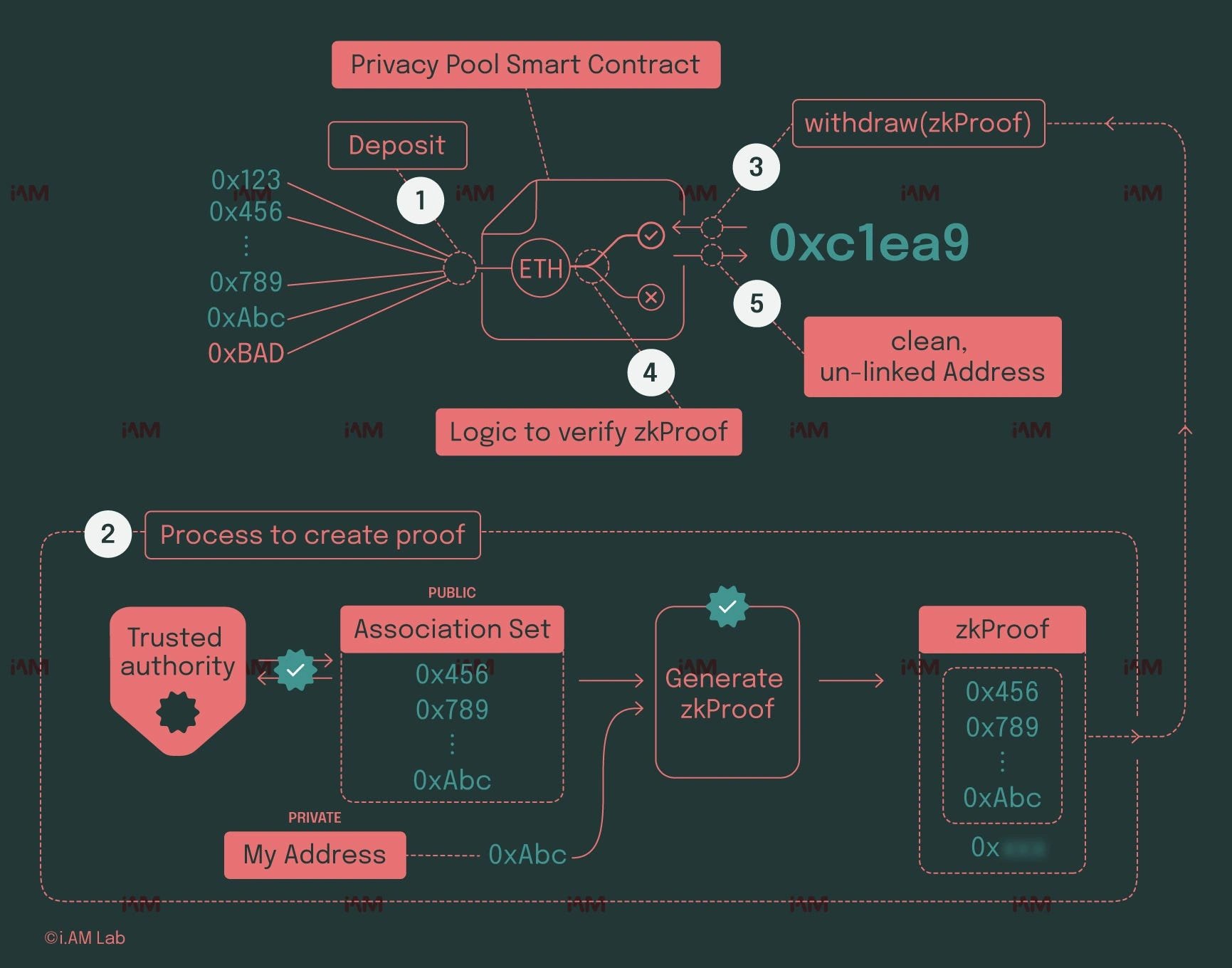위키 구독하기
Share wiki
Bookmark
Privacy Pools
0%
Privacy Pools
프라이버시 풀은 사용자가 블록체인의 공개적인 특성을 활용하면서도 사용자 거래의 프라이버시를 강화하는 새로운 스마트 계약 기반 도구입니다.[2][3]
개요
프라이버시 풀은 사용자가 암호화폐 소유권을 비공개로 유지하면서 공유 풀에 암호화폐를 예치할 수 있도록 하는 새로운 개념입니다. 이 풀은 암호화 방식으로 숨겨진 기록을 사용하여 소유권을 추적하며, 사용자는 이전 예치와 연결 없이 인출할 수 있습니다. 또한 프라이버시 풀을 통해 사용자는 구체적인 내용을 밝히지 않고도 거래의 합법성을 입증할 수 있습니다.
프라이버시 풀의 핵심 아이디어는 사용자가 전체 거래 그래프를 공개적으로 밝히지 않고도 자신의 자금이 합법적인 출처에서 비롯되었음을 입증하는 영지식 증명을 게시할 수 있도록 하는 것입니다. 해당 증명이 유효성 검사를 받으면 해당 지갑 주소가 스마트 계약 프로토콜에 의해 "허용 목록"에 추가되어 거래가 일괄 처리되고 혼합되는 사용자 그룹에 참여할 수 있습니다. 이 혼합은 풀에서 누가 궁극적으로 거래 발신자인지 식별하기 어렵게 만들어 사용자 프라이버시를 제공합니다.[1][3]
프라이버시 풀은 이더리움 설립자 비탈릭 부테린이 이더리움 커뮤니티 구성원 및 블록체인 분석 회사인 Chainalysis의 연구원들과 함께 이 문제에 대한 설득력 있는 솔루션을 제공하는 제안입니다. 프라이버시 풀은 사용자 프라이버시와 규정 준수가 상호 배타적인 개념이 아니라는 것을 입증하는 첫 번째 단계입니다.[3]
프라이버시 풀 작동 방식

프라이버시 풀은 범죄 활동과 합법적인 자금을 격리된 세트 또는 범주로 구성하여 분리함으로써 거래의 프라이버시를 보호하고 사용자가 자신의 자금이 불법 자금과 혼합되지 않았음을 규제 기관에 증명할 수 있도록 하는 것을 목표로 합니다.
이는 거래의 합법성과 범죄 활동과의 관련성 부재를 입증하기 위해 영지식 증명과 같은 기술을 사용하여 달성됩니다. 영지식 증명은 한 당사자(증명자)가 정보 자체에 대한 세부 정보를 밝히지 않고도 특정 정보에 대한 지식을 다른 당사자(검증자)에게 입증할 수 있도록 하는 암호화 기술입니다.
사용자가 프라이버시 풀에서 돈을 인출하려는 경우 영지식 증명을 생성하도록 선택할 수 있습니다. 이 증명은 두 가지 작업을 수행합니다. 첫째, 사용자의 거래가 합법적이며 범죄 활동과 관련된 블록체인 주소와 관련이 없음을 확인합니다. 둘째, 사용자에게 더 중요한 것은 자신의 신원을 비공개로 유지한다는 것입니다.[6]
영지식 기술을 사용하는 프라이버시 풀은 거래 데이터에 대한 사용자 프라이버시를 제공하는 동시에 범죄 활동과 구별하므로 이론적으로 이 문제의 일부를 해결할 수 있습니다. 정직한 거래를 함께 풀링함으로써 사용자는 자신의 거래가 정직한 예치금 중 하나에서 비롯되었음을 증명할 수 있습니다.
프라이버시 풀은 여러 사용자 거래를 혼합하여 실제 출처를 가리는 방식으로 토네이도 캐시와 유사하게 작동합니다. 그러나 사용자가 자금을 인출하도록 선택하면 영지식 증명을 생성할 수 있습니다.[7]
비판
- 개인 키 전송에 대한 취약성
- 무죄 추정의 원칙
일부 사용자는 보다 근본적이고 철학적인 수준에서 프라이버시 풀의 개념을 비판했습니다. 예를 들어, 개인 거래를 위해 영지식 증명을 사용하는 가장 초기 및 가장 유명한 블록체인 네트워크 중 하나인 Zcash의 설립자인 Zooko Wilcox는 개인에 대한 가장 강력한 프라이버시 보장은 가능한 한 "현금"에 가까워 보이는 시스템에서 나온다고 믿습니다. 프라이버시 풀에 대한 그의 비판은 구성이 미국 및 유럽 법률 시스템의 기반이 되는 "무죄 추정의 원칙"과 정반대라는 사실에 초점을 맞추고 있습니다.[3]
잘못된 내용이 있나요?
